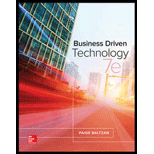
BUSINESS DRIVEN TECHNOLOGY(LL)-W/ACCESS
7th Edition
ISBN: 9781260149043
Author: BALTZAN
Publisher: MCGRAW-HILL HIGHER EDUCATION
expand_more
expand_more
format_list_bulleted
Concept explainers
Question
Chapter B, Problem B5.3MBD
Program Plan Intro
Network:
- It is used to connect the more than two computer devices.
- Type of network topologies
- Bus topology
- Each computer device are interrelated to a single wire.
- It is used in small network.
- It is simple network topology for connecting devices
- Mesh topology
- Every node combine to distribute data amongst each other.
- Since the multiple devices can transmit data simultaneously, it can be able to manage high amount of traffic.
- Ring topology
- The network connection made by circular way in this methodology.
- Here the data flows in same direction so this topology decrease probability of packet crash.
- Star topology
- Each device connects to a middle node which might be hub or switch.
- Using this topology, simply add a node to network.
- If one device is failed in network, then other node continues the function normally.
- Tree topology
- It can be used to connect more than two devices.
- Hybrid topology
- It is mix of all topologies.
- Bus topology
- Network types
- Local Area Network (LAN)
- It can be used to connect devices inside a building.
- Metropolitan area network (MAN)
- The network that develops over a broad geographic area
- Wide area network (WAN)
- It is same as like LAN however spans a whole city or campus.
- Local Area Network (LAN)
Wireless Technology:
- It is used for transfer the data using without cable or with cables.
- The many wireless technology uses the radio waves.
- It is usually used for connecting devices in wireless mode.
- Example for wireless technology
- Cellular phones and pagers
- Cordless computer peripherals
- Global positioning system
Expert Solution & Answer
Want to see the full answer?
Check out a sample textbook solution
Students have asked these similar questions
Answer the question fully and accurately by providing the required files(Java Code, Two output files and written answers to questions 1-3 in a word document)meaning question 1 to 3 also provide correct answers for those questions.(note: this quetion is not graded).
.NET Interactive
Solving Sudoku using Grover's Algorithm
We will now solve a simple problem using Grover's algorithm, for which we do not necessarily know the solution beforehand. Our problem is a 2x2 binary sudoku, which in our case has two simple rules:
•No column may contain the same value twice
•No row may contain the same value twice
If we assign each square in our sudoku to a variable like so:
1
V V₁
V3
V2
we want our circuit to output a solution to this sudoku.
Note that, while this approach of using Grover's algorithm to solve this problem is not practical (you can probably find the solution in your head!), the purpose of this example is to demonstrate the
conversion of classical decision problems into oracles for Grover's algorithm.
Turning the Problem into a Circuit
We want to create an oracle that will help us solve this problem, and we will start by creating a circuit that identifies a correct solution, we simply need to create a classical function on a quantum circuit
that…
.NET Interactive
Solving Sudoku using Grover's Algorithm
We will now solve a simple problem using Grover's algorithm, for which we do not necessarily know the solution beforehand. Our problem is a 2x2 binary sudoku, which in our case has two simple rules:
•No column may contain the same value twice
•No row may contain the same value twice
If we assign each square in our sudoku to a variable like so:
1
V V₁
V3
V2
we want our circuit to output a solution to this sudoku.
Note that, while this approach of using Grover's algorithm to solve this problem is not practical (you can probably find the solution in your head!), the purpose of this example is to demonstrate the
conversion of classical decision problems into oracles for Grover's algorithm.
Turning the Problem into a Circuit
We want to create an oracle that will help us solve this problem, and we will start by creating a circuit that identifies a correct solution, we simply need to create a classical function on a quantum circuit
that…
Chapter B Solutions
BUSINESS DRIVEN TECHNOLOGY(LL)-W/ACCESS
Ch. B - Prob. B1.1MBDCh. B - Prob. B1.2MBDCh. B - Prob. B1.3MBDCh. B - Prob. B1.4MBDCh. B - Prob. B1.5MBDCh. B - Prob. B1.6MBDCh. B - Prob. B2.1MBDCh. B - Modeling a Business Process Do you hate waiting in...Ch. B - Prob. B2.3MBDCh. B - Prob. B2.4MBD
Ch. B - Prob. B2.5MBDCh. B - Prob. B3.1MBDCh. B - Prob. B3.2MBDCh. B - Prob. B4.1MBDCh. B - Prob. B4.2MBDCh. B - Prob. B4.3MBDCh. B - Prob. B4.4MBDCh. B - Prob. B4.5MBDCh. B - Prob. B4.6MBDCh. B - Prob. B4.7MBDCh. B - Prob. B4.8MBDCh. B - Prob. B4.9MBDCh. B - Prob. B4.10MBDCh. B - Prob. B4.11MBDCh. B - Prob. B5.1MBDCh. B - Prob. B5.2MBDCh. B - Prob. B5.3MBDCh. B - Prob. B5.4MBDCh. B - Prob. B5.5MBDCh. B - Prob. B5.6MBDCh. B - Prob. B6.1MBDCh. B - Prob. B6.2MBDCh. B - Prob. B6.3MBDCh. B - Prob. B6.4MBDCh. B - Prob. B6.5MBDCh. B - Prob. B7.1MBDCh. B - Prob. B7.2MBDCh. B - Prob. B7.3MBDCh. B - Prob. B7.4MBDCh. B - Prob. B7.5MBDCh. B - Prob. B7.6MBDCh. B - Prob. B7.7MBDCh. B - Prob. B7.8MBDCh. B - Prob. B7.9MBDCh. B - Prob. B7.10MBDCh. B - Prob. B7.11MBDCh. B - Prob. B8.1MBDCh. B - Prob. B8.2MBDCh. B - Prob. B9.1MBDCh. B - Prob. B9.2MBDCh. B - Prob. B9.3MBDCh. B - Prob. B9.4MBDCh. B - Prob. B9.5MBDCh. B - Prob. B9.6MBDCh. B - Prob. B9.7MBDCh. B - Prob. B9.8MBDCh. B - Prob. B9.9MBDCh. B - Prob. B9.10MBDCh. B - Prob. B10.1MBDCh. B - Prob. B10.2MBDCh. B - Prob. B10.3MBDCh. B - Prob. B10.4MBDCh. B - Prob. B10.5MBDCh. B - Prob. B11.1MBDCh. B - Prob. B11.2MBDCh. B - Prob. B11.3MBDCh. B - Prob. B11.4MBDCh. B - Prob. B12.1MBDCh. B - Prob. B12.2MBDCh. B - Prob. B12.3MBDCh. B - Prob. B12.4MBDCh. B - Prob. B12.5MBDCh. B - Prob. B12.6MBD
Knowledge Booster
Learn more about
Need a deep-dive on the concept behind this application? Look no further. Learn more about this topic, computer-science and related others by exploring similar questions and additional content below.Similar questions
- Please answer Java OOP Questions.arrow_forward.NET Interactive Solving Sudoku using Grover's Algorithm We will now solve a simple problem using Grover's algorithm, for which we do not necessarily know the solution beforehand. Our problem is a 2x2 binary sudoku, which in our case has two simple rules: •No column may contain the same value twice •No row may contain the same value twice If we assign each square in our sudoku to a variable like so: 1 V V₁ V3 V2 we want our circuit to output a solution to this sudoku. Note that, while this approach of using Grover's algorithm to solve this problem is not practical (you can probably find the solution in your head!), the purpose of this example is to demonstrate the conversion of classical decision problems into oracles for Grover's algorithm. Turning the Problem into a Circuit We want to create an oracle that will help us solve this problem, and we will start by creating a circuit that identifies a correct solution, we simply need to create a classical function on a quantum circuit that…arrow_forwardNeed help with this in python!arrow_forward
arrow_back_ios
SEE MORE QUESTIONS
arrow_forward_ios
Recommended textbooks for you
 Principles of Information Systems (MindTap Course...Computer ScienceISBN:9781305971776Author:Ralph Stair, George ReynoldsPublisher:Cengage Learning
Principles of Information Systems (MindTap Course...Computer ScienceISBN:9781305971776Author:Ralph Stair, George ReynoldsPublisher:Cengage Learning Fundamentals of Information SystemsComputer ScienceISBN:9781337097536Author:Ralph Stair, George ReynoldsPublisher:Cengage Learning
Fundamentals of Information SystemsComputer ScienceISBN:9781337097536Author:Ralph Stair, George ReynoldsPublisher:Cengage Learning Information Technology Project ManagementComputer ScienceISBN:9781337101356Author:Kathy SchwalbePublisher:Cengage Learning
Information Technology Project ManagementComputer ScienceISBN:9781337101356Author:Kathy SchwalbePublisher:Cengage Learning Management Of Information SecurityComputer ScienceISBN:9781337405713Author:WHITMAN, Michael.Publisher:Cengage Learning,
Management Of Information SecurityComputer ScienceISBN:9781337405713Author:WHITMAN, Michael.Publisher:Cengage Learning, Fundamentals of Information SystemsComputer ScienceISBN:9781305082168Author:Ralph Stair, George ReynoldsPublisher:Cengage Learning
Fundamentals of Information SystemsComputer ScienceISBN:9781305082168Author:Ralph Stair, George ReynoldsPublisher:Cengage Learning Information Technology Project ManagementComputer ScienceISBN:9781285452340Author:Kathy SchwalbePublisher:Cengage Learning
Information Technology Project ManagementComputer ScienceISBN:9781285452340Author:Kathy SchwalbePublisher:Cengage Learning

Principles of Information Systems (MindTap Course...
Computer Science
ISBN:9781305971776
Author:Ralph Stair, George Reynolds
Publisher:Cengage Learning

Fundamentals of Information Systems
Computer Science
ISBN:9781337097536
Author:Ralph Stair, George Reynolds
Publisher:Cengage Learning

Information Technology Project Management
Computer Science
ISBN:9781337101356
Author:Kathy Schwalbe
Publisher:Cengage Learning

Management Of Information Security
Computer Science
ISBN:9781337405713
Author:WHITMAN, Michael.
Publisher:Cengage Learning,

Fundamentals of Information Systems
Computer Science
ISBN:9781305082168
Author:Ralph Stair, George Reynolds
Publisher:Cengage Learning

Information Technology Project Management
Computer Science
ISBN:9781285452340
Author:Kathy Schwalbe
Publisher:Cengage Learning